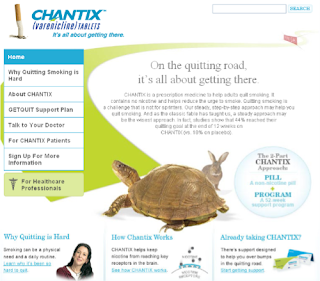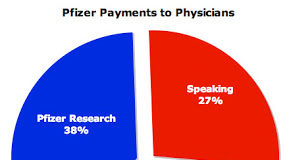 Slow and steady wins the race. That is the message of the new Chantix TV DTC (direct to consumer) ads that feature a race between a tortoise and a hare.
Slow and steady wins the race. That is the message of the new Chantix TV DTC (direct to consumer) ads that feature a race between a tortoise and a hare.
The Chantix tortoise is not related to the Comcastic “Slowsky’s” shown in this YouTube video (one of my favorite TV commercials!):
 BTW, the hare on the Chantix TV ad is a scrawny, reddish — devilish, may one say? — hare; not a cute cuddly rabbit like the Eveready bunny!
BTW, the hare on the Chantix TV ad is a scrawny, reddish — devilish, may one say? — hare; not a cute cuddly rabbit like the Eveready bunny!
Yet, strange to say, this devilish-looking hare does NOT make it to the Chantix Web site, which features a much more ordinary and benign-looking RABBIT (see image on left, click to enlarge).
All this imagery serves a purpose — the Chantix marketers are telling us that quitting smoking is long process requiring a steady, tortoise-like approach.
According to the Web site:
“Quitting smoking is a challenge that is not for sprinters. Our steady, step-by-step approach may help you quit smoking. And as the classic fable has taught us, a steady approach may be the wisest approach. In fact, studies show that 44% reached their quitting goal at the end of 12 weeks on CHANTIX (vs. 18% on placebo). “
According to a November, 2006 Wall Street Journal article, “Pfizer has … adopted a measured marketing approach because it knows that older antismoking medicines like nicotine gum boomed and then busted. Sales surged as people rushed for a quick fix for their habits but fell amid disappointment resulting from ‘unrealistic expectations’ of success, Ian Read, president of pharmaceuticals at Pfizer, remarked in a call with analysts…”
Unrealistic Expectations
It seems these days that several drug brands are grappling with “unrealistic expectations.” Alli, an OTC weight-loss, drug employs a similar approach. You can read the Alli blog post post “Unrealistic weight loss goals: who’s responsible?” and learn that the”Number of pounds lost should not be the only yardstick of success.” Translation: despite claims made on the QuestionEverything.com discussion board sponsored by GSK — click here — you won’t lose 110 lbs taking Alli/Xenical.
With smoking cessation products, however, you either succeed or you don’t. But that kind of success is not what the Chantix marketers focus on. The only claim made is what percentage of people “quit” smoking during a 12-week period. Not much data beyond the 12 weeks is reported.
That’s the Pill side of the equation. Now, add to that the Plan; ie, the GETQUIT™ 52-week support plan, which includes:
- A step-by-step guide for preparing to quit
- A personalized Web site with easy-to-use tools that track your progress
- Support and advice designed to help you learn how to stay quit
- Support for up to a full year
- A toll-free support hotline to speak with a GETQUIT coach
I discussed this program before — see “Chantix: Opportunity for Social Marketing Lost?” — and I think I signed up for it.
Unfortunately, there were technical difficulties logging back into the program, so I guess *I’ll have to do without the plan for now.
P.S. Do only life-style drugs like Chantix and Alli deserve a Support Plan developed by experts? According to FDA guidelines, many drugs require lifestyle changes to achieve maximum effect — at least that’s what the FDA would like drug marketers to say in their ads.
Shouldn’t Pfizer include a 52-week cholesterol-lowering support plan with Lipitor? Mostly, what they offer is more information about Lipitor and cholesterol-lowering factoids — nothing that would really qualify as a “plan developed by behavioral experts.”









![6 Digital Tools at the Center of Healthcare Digitalization [INFOGRAPHIC]](http://ec2-54-175-84-28.compute-1.amazonaws.com/pharma-mkting.com/wp-content/uploads/2021/04/6DigitalTools_600px-100x70.jpg)




